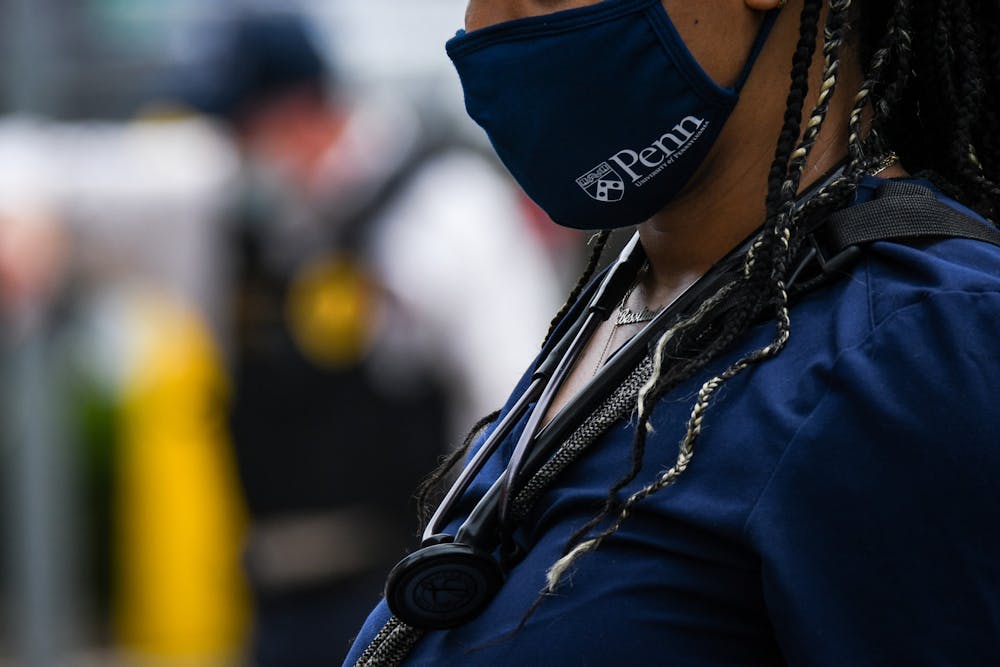While Penn undergraduate students living on or off campus enjoyed virtually unlimited access to COVID-19 testing this semester at Houston Hall, health care workers at Penn hospitals — even those who treat COVID-19 patients — continue to jump through hoops simply to get a COVID-19 test.
The Daily Pennsylvanian spoke to more than a dozen nurses, doctors, and clinical students who work across Penn Medicine’s hospital system in a wide array of specialties. Many health care workers requested to remain anonymous for fear of retaliation from their employer. From these conversations, a picture of Penn Med emerged where frontline workers are praised for their courage and selflessness yet are denied COVID-19 tests. Penn undergraduates, however, will be required to test twice a week in the spring.
One COVID-19 Intensive Care Unit nurse at Penn Presbyterian Hospital, who has spent her 12-hour shifts treating COVID-19 patients since February, said that friends and family are often shocked to learn she and most nurses on her floor have never gotten a COVID-19 test.
“We are never tested,” she said. “Before COVID, I don't think any of us felt like we were being so undervalued, but I think that this situation has brought on a whole new set of issues that nobody really saw coming.”
A Penn Med spokesperson wrote in an email to the DP that health care workers at Penn Med can only be tested under very specific, limited circumstances, such as when they are symptomatic or have any “exposures." Treating COVID-19 patients while wearing proper protective equipment is not considered an exposure that warrants testing, multiple health care workers at Penn Med told the DP.
Some nurses who have had high-risk exposures to COVID-19 positive employees were still denied tests from Penn Med.
Across Penn Med's various hospitals, health care workers described a “cumbersome” process of getting a COVID-19 test, which requires an employee to first seek permission from their employer before a testing appointment can be scheduled. This process that can take days, if not a week, even for those who are symptomatic, according to one student registered nurse anesthetist.
“For health care workers, there’s been substantial delays in trying to get a COVID test," he said. "Some people have to wait four or five days to get an appointment. They self-quarantine during that time, but for peace of mind and safeguarding everyone else, that's definitely an issue."
RELATED:
Thanksgiving break travel prompts Penn’s semester-high COVID-19 positivity rate
Penn to fully transition to saliva-based COVID-19 testing Dec. 7
Penn Med Spokesperson Holly Auer did not respond to multiple requests for comment on how health care workers who are asymptomatic, symptomatic, or have been exposed to a positive case can get a COVID-19 test.
Some health care workers who were denied COVID-19 tests by Penn Med because they were asymptomatic or their exposure was deemed not risky enough to warrant testing, including one medical trainee, told the DP they were encouraged to get tested at other facilities not affiliated with Penn. These tests often require at least a 20-minute drive to a separate testing site.
The process of getting a COVID-19 test, which one oncology nurse at the Hospital of the University of Pennsylvania described as “confusing” and “stressful,” can be so complicated that some health care workers have resorted to paying out-of-pocket for COVID-19 tests at private labs like Vybe Urgent Care, sometimes adding up to hundreds of dollars in testing fees. A nurse from Penn Med said she had to pay $80 out of pocket for a COVID-19 test, only after she negotiated a reduced fee from $130 with the private lab.
Without a negative test result to quell their fears, those who work with an employee who was possibly exposed to COVID-19 are left to question their own safety without a definitive answer. This uncertainty leads to high anxiety and low morale across the hospitals, said one Penn Med nursing student who worked on a unit with COVID-19 patients, but did not treat them directly.
“You get a cough or a headache and think, 'I've been exposed to COVID patients all week. Is this COVID?' It’s really tough,” she said.
A positive case — now what?
Identifying positive COVID-19 cases without widespread testing is already a challenging feat that has stumped even the nation’s best epidemiologists. But many health care workers say even when positive cases are identified among employees, they have been “swept under the rug” by Occupational Medicine, which conducts contact tracing efforts at Penn’s hospitals.
A labor and delivery nurse at Penn Med said that just last week, one of her coworkers tested positive for COVID-19. Despite being in direct contact with a positive case, the nurse said she was not granted permission to receive a test from Penn Med.
“They were only testing people that were exposed if they had symptoms, so even if you do have a known exposure, it seems like it's like a lot of hoops to jump through to even get tested,” she said. “Another nurse I work with was really upset about it and had to basically beg them to give her a test.”
She added that she had lost faith in the contact tracing process after being given information from an Occupational Medicine contact tracer that contradicts Centers for Disease Control and Prevention guidelines.
“The craziest thing to me is that [an Occupational Medicine representative] said, ‘Oh, well it's been more than two days [since the exposure], so if you haven't gotten symptoms, you’re likely not going to get it,’” she said, recounting her phone call with the contact tracer.
According to the CDC, the incubation period for COVID-19 extends to 14 days with a median time of four to five days from exposure to showing signs of symptoms.
Similarly, a SRNA nurse said that he still has not been contacted by Occupational Medicine regarding a high-risk exposure he had with another nurse who tested positive for COVID-19 two weeks ago. Instead, he learned he was exposed through word-of-mouth chatter among co-workers.
“I had worked in close contact with a nurse in the [operating room] who for three days straight showed up to work not feeling well and was never encouraged to go home, because of how short-staffed my facility is, and it turns out she tested positive for COVID," he said. "I was in close quarters with her for multiple days in a row, and I still never had been notified by senior management or administration, nothing.”
The debate over testing
The lack of routine employee testing at Penn Med is not an abnormality. Just this November, a survey from National Nurses United found that less than half of registered nurses in hospitals report that they have ever been tested for COVID-19.
On a national level, testing resources do exist, but are often allocated in ways that baffle health care workers who risk their lives each day to treat patients. At the University of California, Los Angeles, registered nurses protested the University’s decision to deny health care workers testing while administering thousands of tests to its student-athletes each week.
“It's so frustrating for me to see that different sports teams are getting tested regularly so they can keep playing, but then health care workers, not even the ones taking care of COVID patients regularly, can get tested without showing symptoms,” another registered nurse at Penn Med said.
The nurse added that she feels fortunate to have been selected to participate in COVID SAFE, a six-month research study that offers weekly saliva-based viral testing and screening to Penn faculty and staff. She said, however, the study would not have the capacity to test all employees in the hospital system.
Hospital workers often spend 12-hour shifts in very close quarters with staff on their floor, where it is difficult to socially distance — conditions that could contribute to a silent spread of the virus absent routine testing, one nurse said.
“I'm sure a bunch of nurses are spreading [COVID-19] to other nurses, but they don't know that they have it,” the oncology nurse said.
Nurses and therapists in Penn Med's Home Health branch are also at a high exposure risk, because their jobs necessitate bathing, washing, and clothing patients in their homes where social distancing is close to impossible, Professor of Clinical Medicine Valerianna Amorosa said.
“I think that there's some utility probably in doing frequent screening of people who are at high risk to sort of pull them out quicker than you would by waiting for them to become symptomatic," she said.
Following a surge in COVID-19 cases, government agencies like the California Department of Health are encouraging hospitals to test their employees each week. From a business standpoint, though, widespread COVID-19 testing has one major downside.
If large swaths of hospital employees test positive and are out of work, who will take care of the patients?
“I don't know if it's like a ‘they don't want to know’ type of thing, because at some point, if there's so many staff out, you just won't have enough to be taking care of patients, especially when our hospitals are this full,” one Penn Med nurse said.
In the meantime, health care workers without symptoms are trapped in an endless cycle of speculation and fear of bringing the virus home to loved ones.
“There's definitely a lot of fear just from a personal standpoint,” the SRNA nurse said. “It's gotten to the point where a lot of us feel helpless, because nothing's getting done. No one's advocating for us.”








